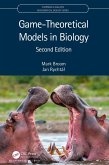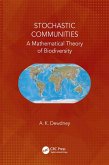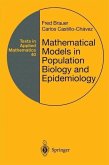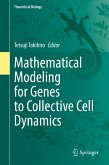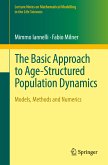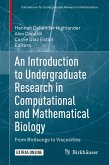46,95 €
46,95 €
inkl. MwSt.
Sofort per Download lieferbar

23 °P sammeln
46,95 €
Als Download kaufen

46,95 €
inkl. MwSt.
Sofort per Download lieferbar

23 °P sammeln
Jetzt verschenken
Alle Infos zum eBook verschenken
46,95 €
inkl. MwSt.
Sofort per Download lieferbar
Alle Infos zum eBook verschenken

23 °P sammeln
- Format: PDF
- Merkliste
- Auf die Merkliste
- Bewerten Bewerten
- Teilen
- Produkt teilen
- Produkterinnerung
- Produkterinnerung

Bitte loggen Sie sich zunächst in Ihr Kundenkonto ein oder registrieren Sie sich bei
bücher.de, um das eBook-Abo tolino select nutzen zu können.
Hier können Sie sich einloggen
Hier können Sie sich einloggen
Sie sind bereits eingeloggt. Klicken Sie auf 2. tolino select Abo, um fortzufahren.

Bitte loggen Sie sich zunächst in Ihr Kundenkonto ein oder registrieren Sie sich bei bücher.de, um das eBook-Abo tolino select nutzen zu können.
Covering the major topics of evolutionary game theory, this book presents both abstract and practical mathematical models of real biological situations. It discusses the static aspects of game theory in a mathematically rigorous way that is appealing to mathematicians. The text is also useful to biologists.
- Geräte: PC
- mit Kopierschutz
- eBook Hilfe
Andere Kunden interessierten sich auch für
![Game-Theoretical Models in Biology (eBook, ePUB) Game-Theoretical Models in Biology (eBook, ePUB)]() Mark BroomGame-Theoretical Models in Biology (eBook, ePUB)46,95 €
Mark BroomGame-Theoretical Models in Biology (eBook, ePUB)46,95 €![Stochastic Communities (eBook, PDF) Stochastic Communities (eBook, PDF)]() A. K. DewdneyStochastic Communities (eBook, PDF)48,95 €
A. K. DewdneyStochastic Communities (eBook, PDF)48,95 €![Mathematical Models in Population Biology and Epidemiology (eBook, PDF) Mathematical Models in Population Biology and Epidemiology (eBook, PDF)]() Fred BrauerMathematical Models in Population Biology and Epidemiology (eBook, PDF)53,95 €
Fred BrauerMathematical Models in Population Biology and Epidemiology (eBook, PDF)53,95 €![Computational Cell Biology (eBook, PDF) Computational Cell Biology (eBook, PDF)]() Computational Cell Biology (eBook, PDF)62,95 €
Computational Cell Biology (eBook, PDF)62,95 €![Mathematical Modeling for Genes to Collective Cell Dynamics (eBook, PDF) Mathematical Modeling for Genes to Collective Cell Dynamics (eBook, PDF)]() Mathematical Modeling for Genes to Collective Cell Dynamics (eBook, PDF)129,95 €
Mathematical Modeling for Genes to Collective Cell Dynamics (eBook, PDF)129,95 €![The Basic Approach to Age-Structured Population Dynamics (eBook, PDF) The Basic Approach to Age-Structured Population Dynamics (eBook, PDF)]() Mimmo IannelliThe Basic Approach to Age-Structured Population Dynamics (eBook, PDF)57,95 €
Mimmo IannelliThe Basic Approach to Age-Structured Population Dynamics (eBook, PDF)57,95 €![An Introduction to Undergraduate Research in Computational and Mathematical Biology (eBook, PDF) An Introduction to Undergraduate Research in Computational and Mathematical Biology (eBook, PDF)]() An Introduction to Undergraduate Research in Computational and Mathematical Biology (eBook, PDF)40,95 €
An Introduction to Undergraduate Research in Computational and Mathematical Biology (eBook, PDF)40,95 €-
-
-
Covering the major topics of evolutionary game theory, this book presents both abstract and practical mathematical models of real biological situations. It discusses the static aspects of game theory in a mathematically rigorous way that is appealing to mathematicians. The text is also useful to biologists.
Hinweis: Dieser Artikel kann nur an eine deutsche Lieferadresse ausgeliefert werden.
Dieser Download kann aus rechtlichen Gründen nur mit Rechnungsadresse in A, B, BG, CY, CZ, D, DK, EW, E, FIN, F, GR, HR, H, IRL, I, LT, L, LR, M, NL, PL, P, R, S, SLO, SK ausgeliefert werden.
Hinweis: Dieser Artikel kann nur an eine deutsche Lieferadresse ausgeliefert werden.
Produktdetails
- Produktdetails
- Verlag: Taylor & Francis eBooks
- Seitenzahl: 622
- Erscheinungstermin: 3. August 2022
- Englisch
- ISBN-13: 9781000623680
- Artikelnr.: 64184778
- Verlag: Taylor & Francis eBooks
- Seitenzahl: 622
- Erscheinungstermin: 3. August 2022
- Englisch
- ISBN-13: 9781000623680
- Artikelnr.: 64184778
- Herstellerkennzeichnung Die Herstellerinformationen sind derzeit nicht verfügbar.
Mark Broom is a professor of mathematics at City, University of London. For over 30 years, he has carried out mathematical research in game theory applied to biology. His major research themes include multi-player games, patterns of evolutionarily stable strategies, models of parasitic behavior (especially kleptoparasitism), the evolution of defence and signalling, and evolutionary processes in structured populations. He earned his PhD in mathematics from the University of Sheffield.
Jan Rychtár¿
is a professor of mathematics at Virginia Commonwealth University. Prior to joining VCU, he was a Professor at UNC Greensboro. He works on game theoretical models and mathematical models of kleptoparasitism. His recent research interests include mathematical biology and game theory. He earned his PhD in mathematics from the University of Alberta.
Jan Rychtár¿
is a professor of mathematics at Virginia Commonwealth University. Prior to joining VCU, he was a Professor at UNC Greensboro. He works on game theoretical models and mathematical models of kleptoparasitism. His recent research interests include mathematical biology and game theory. He earned his PhD in mathematics from the University of Alberta.
1. Introduction. 1.1. The History of Evolutionary Games. 1.2. The Key
Mathematical Developments. 1.3. The Range of Applications. 1.4. Reading
this Book. 2. What is a Game? 2.1. Key Game Elements. 2.2. Games in
Biological Settings. 2.3. Further Reading. 2.4. Exercises. 3. Two
Approaches to Game Analysis. 3.1. The Dynamical Approach. 3.2. The Static
Approach - ESS. 3.3. Dynamics Versus Statics. 3.4. Python Code. 3.5 Further
Reading. 3.6 Exercises. 4. Some Classical Games. 4.1. The Hawk-Dove Game.
4.2. The Prisoner's Dilemma. 4.3. The War of Attrition. 4.4. The Sex Ratio
Game. 4.5. Python Code. 4.6. Further Reading. 4.7. Exercises. 5. The
Underlying Biology. 5.1. Darwin and Natural Selection. 5.2. Genetics. 5.3.
Games Involving Genetics. 5.4. Fitness, Strategies and Players. 5.5.
Selfish Genes: How can Non-Beneficial Genes Propagate? 5.6. The Role of
Simple Mathematical Models. 5.7. Python Code. 5.8. Further Reading. 5.9.
Exercises. 6. Matrix Games. 6.1 Properties of ESSs. 6.2. ESSs in a 2 × 2
Matrix Game. 6.3. Haigh's Procedure to Locate all ESSs. 6.4. ESSs in a 3 ×
3 Matrix Game. 6.5. Patterns of ESSs 6.6. Extensions to the Hawk-Dove Game.
6.7. Python Code. 6.8. Further Reading. 6.9. Exercises. 7. Nonlinear Games.
7.1 Overview and General Theory. 7.2. Linearity in the Focal Player
Strategy and Playing the Field. 7.3. Nonlinearity Due to Non-Constant
Interaction Rates. 7.4. Nonlinearity due to Games with Time Constraints.
7.5. Nonlinearity in the Strategy of the Focal Player. 7.6. Linear Versus
Nonlinear Theory. 7.7. Python Code. 7.8. Further Reading. 7.9. Exercises.
8. Asymmetric Games. 8.1. Selten's Theorem for Games with Two Roles. 8.2.
Bimatrix Games. 8.3. Uncorrelated Asymmetry-The Owner-Intruder Game. 8.4.
Correlated Asymmetry. 8.7. Python Code. 8.8. Further Reading. 8.9.
Exercises. 9. Multi-player Games. 9.1. Multi-player Matrix Games. 9.2. The
multi-player War of Attrition. 9.3 Structures of Dependent Pairwise Games.
9.7. Python Code. 9.8. Further Reading. 9.9. Exercises. 10. Extensive Form
Games and other Concepts in Game Theory. 10.1. Games in Extensive Form.
10.2. Perfect, imperfect and incomplete information. 10.3. Repeated games.
10.4. Python Code. 10.5. Further Reading. 10.6. Exercises. 11. State-based
Games. 11.1. State-based Games. 11.2. A Question of Size. 11.3. Life
History Theory. 11.7. Python Code. 11.8. Further Reading. 11.9. Exercises.
12. Games in Finite Populations and on Graphs. 12.1. Finite Populations and
Stochastic Games. 12.2. Games in Finite Populations. 12.3. Evolution on
Graphs. 12.4 Games on Graphs. 12.7. Python Code. 12.8. Further Reading.
12.9. Exercises. 13. Evolution in Structured Populations. 13.1. Spatial
Games and Cellular Automata. 13.2. Theoretical Developments for Modelling
General Structures. 13.3. Evolution in Structured Populations with
Multi-Player Interactions. 13.4. More Multi-Player Games. 13.5. Evolving
Population Structures. 13.7. Python Code. 13.8. Further Reading. 13.9.
Exercises. 14. Adaptive Dynamics. 14.1. Introduction and Philosophy. 14.2.
Fitness Functions and the Fitness Landscape. 14.3. Pairwise Invasibility
and Evolutionarily Singular Strategies. 14.4. Adaptive Dynamics with
Multiple Traits. 14.5. The Assumptions of Adaptive Dynamics. 14.6. Python
Code. 14.7. Further Reading. 14.8. Exercises. 15. The Evolution of
Cooperation. 15.1. Kin Selection and Inclusive Fitness. 15.2. Greenbeard
Genes. 15.3. Direct Reciprocity: Developments of the Prisoner's Dilemma.
15.4. Public Goods Games. 15.5. Indirect Reciprocity and Reputation
Dynamics. 15.6. The Evolution of Cooperation on Graphs. 15.7. Multi-level
Selection. 15.8. Python Code. 15.9. Further Reading. 15.10. Exercises. 16.
Group Living. 16.1. The Costs and Benefits of Group Living. 16.2. Dominance
Hierarchies: Formation and Maintenance. 16.3. The Enemy without: Responses
to Predators. 16.4. The Enemy Within: Infanticide and Other anti-social
Behaviour. 16.5. Python Code. 16.6. Further Reading. 16.7. Exercises. 17.
Mating Games. 17.1. Introduction and Overview. 17.2. Direct Conflict. 17.3.
Indirect Conflict and Sperm Competition. 17.4. The Battle of the Sexes.
17.5. Python Code. 17.6. Further Reading. 17.7. Exercises. 18. Signalling
Games. 18.1. The Theory of Signalling Games. 18.2. Selecting Mates:
Signalling and the Handicap Principle. 18.3. Alternative Models of Costly
Honest Signalling. 18.4. Signalling without Cost. 18.5. Pollinator
Signalling Games. 18.6. Python Code. 18.7. Further Reading. 18.8.
Exercises. 19. Food Competition. 19.1. Introduction. 19.2. Ideal Free
Distribution for a Single Species. 19.3. Ideal Free Distribution for
Multiple Species. 19.4. Distributions at and Deviations from the Ideal Free
Distribution. 19.5. Compartmental Models of kleptoparasitism. 19.6.
Compartmental Models of Interference. 19.7. Producer-scrounger Models.
19.8. Python Code. 19.9. Further Reading. 19.10. Exercises. 20.
Predator-prey and host-Parasite Interactions. 20.1. Game-theoretical
Predator-prey Models. 20.2. The Evolution of Defence and Signalling. 20.3.
Brood Parasitism. 20.4. Parasitic Wasps and the Asymmetric war of
Attrition. 20.5. Complex Parasite Lifecycles. 20.6. Search Games Involving
Predators and Prey. 20.7. Python Code. 20.8. Further Reading. 20.9.
Exercises. 21. Epidemic models. 21.1. SIS and SIR models. 21.2. The
Evolution of virulence. 21.3. Viruses and the Prisoner's Dilemma. 21.4.
Vaccination models. 21.5. Python Code. 21.6. Further Reading. 21.7.
Exercises. 22. Evolutionary Cancer Modelling. 22.1. Modelling Tumour Growth
- an Ecological Approach to Cancer. 22.2. A Spatial Model of Cancer
Evolution. 22.3. Cancer therapy as a game-theoretic Scenario. 22.4.
Adaptive Therapies. 22.5. Python Code. 22.6. Further Reading. 22.7.
Exercises. 23. Conclusions. 23.1. Types of Evolutionary Games used in
Biology. 23.2. What Makes a Good Mathematical Model? 23.3. Future
Developments. A. Python.
Mathematical Developments. 1.3. The Range of Applications. 1.4. Reading
this Book. 2. What is a Game? 2.1. Key Game Elements. 2.2. Games in
Biological Settings. 2.3. Further Reading. 2.4. Exercises. 3. Two
Approaches to Game Analysis. 3.1. The Dynamical Approach. 3.2. The Static
Approach - ESS. 3.3. Dynamics Versus Statics. 3.4. Python Code. 3.5 Further
Reading. 3.6 Exercises. 4. Some Classical Games. 4.1. The Hawk-Dove Game.
4.2. The Prisoner's Dilemma. 4.3. The War of Attrition. 4.4. The Sex Ratio
Game. 4.5. Python Code. 4.6. Further Reading. 4.7. Exercises. 5. The
Underlying Biology. 5.1. Darwin and Natural Selection. 5.2. Genetics. 5.3.
Games Involving Genetics. 5.4. Fitness, Strategies and Players. 5.5.
Selfish Genes: How can Non-Beneficial Genes Propagate? 5.6. The Role of
Simple Mathematical Models. 5.7. Python Code. 5.8. Further Reading. 5.9.
Exercises. 6. Matrix Games. 6.1 Properties of ESSs. 6.2. ESSs in a 2 × 2
Matrix Game. 6.3. Haigh's Procedure to Locate all ESSs. 6.4. ESSs in a 3 ×
3 Matrix Game. 6.5. Patterns of ESSs 6.6. Extensions to the Hawk-Dove Game.
6.7. Python Code. 6.8. Further Reading. 6.9. Exercises. 7. Nonlinear Games.
7.1 Overview and General Theory. 7.2. Linearity in the Focal Player
Strategy and Playing the Field. 7.3. Nonlinearity Due to Non-Constant
Interaction Rates. 7.4. Nonlinearity due to Games with Time Constraints.
7.5. Nonlinearity in the Strategy of the Focal Player. 7.6. Linear Versus
Nonlinear Theory. 7.7. Python Code. 7.8. Further Reading. 7.9. Exercises.
8. Asymmetric Games. 8.1. Selten's Theorem for Games with Two Roles. 8.2.
Bimatrix Games. 8.3. Uncorrelated Asymmetry-The Owner-Intruder Game. 8.4.
Correlated Asymmetry. 8.7. Python Code. 8.8. Further Reading. 8.9.
Exercises. 9. Multi-player Games. 9.1. Multi-player Matrix Games. 9.2. The
multi-player War of Attrition. 9.3 Structures of Dependent Pairwise Games.
9.7. Python Code. 9.8. Further Reading. 9.9. Exercises. 10. Extensive Form
Games and other Concepts in Game Theory. 10.1. Games in Extensive Form.
10.2. Perfect, imperfect and incomplete information. 10.3. Repeated games.
10.4. Python Code. 10.5. Further Reading. 10.6. Exercises. 11. State-based
Games. 11.1. State-based Games. 11.2. A Question of Size. 11.3. Life
History Theory. 11.7. Python Code. 11.8. Further Reading. 11.9. Exercises.
12. Games in Finite Populations and on Graphs. 12.1. Finite Populations and
Stochastic Games. 12.2. Games in Finite Populations. 12.3. Evolution on
Graphs. 12.4 Games on Graphs. 12.7. Python Code. 12.8. Further Reading.
12.9. Exercises. 13. Evolution in Structured Populations. 13.1. Spatial
Games and Cellular Automata. 13.2. Theoretical Developments for Modelling
General Structures. 13.3. Evolution in Structured Populations with
Multi-Player Interactions. 13.4. More Multi-Player Games. 13.5. Evolving
Population Structures. 13.7. Python Code. 13.8. Further Reading. 13.9.
Exercises. 14. Adaptive Dynamics. 14.1. Introduction and Philosophy. 14.2.
Fitness Functions and the Fitness Landscape. 14.3. Pairwise Invasibility
and Evolutionarily Singular Strategies. 14.4. Adaptive Dynamics with
Multiple Traits. 14.5. The Assumptions of Adaptive Dynamics. 14.6. Python
Code. 14.7. Further Reading. 14.8. Exercises. 15. The Evolution of
Cooperation. 15.1. Kin Selection and Inclusive Fitness. 15.2. Greenbeard
Genes. 15.3. Direct Reciprocity: Developments of the Prisoner's Dilemma.
15.4. Public Goods Games. 15.5. Indirect Reciprocity and Reputation
Dynamics. 15.6. The Evolution of Cooperation on Graphs. 15.7. Multi-level
Selection. 15.8. Python Code. 15.9. Further Reading. 15.10. Exercises. 16.
Group Living. 16.1. The Costs and Benefits of Group Living. 16.2. Dominance
Hierarchies: Formation and Maintenance. 16.3. The Enemy without: Responses
to Predators. 16.4. The Enemy Within: Infanticide and Other anti-social
Behaviour. 16.5. Python Code. 16.6. Further Reading. 16.7. Exercises. 17.
Mating Games. 17.1. Introduction and Overview. 17.2. Direct Conflict. 17.3.
Indirect Conflict and Sperm Competition. 17.4. The Battle of the Sexes.
17.5. Python Code. 17.6. Further Reading. 17.7. Exercises. 18. Signalling
Games. 18.1. The Theory of Signalling Games. 18.2. Selecting Mates:
Signalling and the Handicap Principle. 18.3. Alternative Models of Costly
Honest Signalling. 18.4. Signalling without Cost. 18.5. Pollinator
Signalling Games. 18.6. Python Code. 18.7. Further Reading. 18.8.
Exercises. 19. Food Competition. 19.1. Introduction. 19.2. Ideal Free
Distribution for a Single Species. 19.3. Ideal Free Distribution for
Multiple Species. 19.4. Distributions at and Deviations from the Ideal Free
Distribution. 19.5. Compartmental Models of kleptoparasitism. 19.6.
Compartmental Models of Interference. 19.7. Producer-scrounger Models.
19.8. Python Code. 19.9. Further Reading. 19.10. Exercises. 20.
Predator-prey and host-Parasite Interactions. 20.1. Game-theoretical
Predator-prey Models. 20.2. The Evolution of Defence and Signalling. 20.3.
Brood Parasitism. 20.4. Parasitic Wasps and the Asymmetric war of
Attrition. 20.5. Complex Parasite Lifecycles. 20.6. Search Games Involving
Predators and Prey. 20.7. Python Code. 20.8. Further Reading. 20.9.
Exercises. 21. Epidemic models. 21.1. SIS and SIR models. 21.2. The
Evolution of virulence. 21.3. Viruses and the Prisoner's Dilemma. 21.4.
Vaccination models. 21.5. Python Code. 21.6. Further Reading. 21.7.
Exercises. 22. Evolutionary Cancer Modelling. 22.1. Modelling Tumour Growth
- an Ecological Approach to Cancer. 22.2. A Spatial Model of Cancer
Evolution. 22.3. Cancer therapy as a game-theoretic Scenario. 22.4.
Adaptive Therapies. 22.5. Python Code. 22.6. Further Reading. 22.7.
Exercises. 23. Conclusions. 23.1. Types of Evolutionary Games used in
Biology. 23.2. What Makes a Good Mathematical Model? 23.3. Future
Developments. A. Python.
1. Introduction. 1.1. The History of Evolutionary Games. 1.2. The Key
Mathematical Developments. 1.3. The Range of Applications. 1.4. Reading
this Book. 2. What is a Game? 2.1. Key Game Elements. 2.2. Games in
Biological Settings. 2.3. Further Reading. 2.4. Exercises. 3. Two
Approaches to Game Analysis. 3.1. The Dynamical Approach. 3.2. The Static
Approach - ESS. 3.3. Dynamics Versus Statics. 3.4. Python Code. 3.5 Further
Reading. 3.6 Exercises. 4. Some Classical Games. 4.1. The Hawk-Dove Game.
4.2. The Prisoner's Dilemma. 4.3. The War of Attrition. 4.4. The Sex Ratio
Game. 4.5. Python Code. 4.6. Further Reading. 4.7. Exercises. 5. The
Underlying Biology. 5.1. Darwin and Natural Selection. 5.2. Genetics. 5.3.
Games Involving Genetics. 5.4. Fitness, Strategies and Players. 5.5.
Selfish Genes: How can Non-Beneficial Genes Propagate? 5.6. The Role of
Simple Mathematical Models. 5.7. Python Code. 5.8. Further Reading. 5.9.
Exercises. 6. Matrix Games. 6.1 Properties of ESSs. 6.2. ESSs in a 2 × 2
Matrix Game. 6.3. Haigh's Procedure to Locate all ESSs. 6.4. ESSs in a 3 ×
3 Matrix Game. 6.5. Patterns of ESSs 6.6. Extensions to the Hawk-Dove Game.
6.7. Python Code. 6.8. Further Reading. 6.9. Exercises. 7. Nonlinear Games.
7.1 Overview and General Theory. 7.2. Linearity in the Focal Player
Strategy and Playing the Field. 7.3. Nonlinearity Due to Non-Constant
Interaction Rates. 7.4. Nonlinearity due to Games with Time Constraints.
7.5. Nonlinearity in the Strategy of the Focal Player. 7.6. Linear Versus
Nonlinear Theory. 7.7. Python Code. 7.8. Further Reading. 7.9. Exercises.
8. Asymmetric Games. 8.1. Selten's Theorem for Games with Two Roles. 8.2.
Bimatrix Games. 8.3. Uncorrelated Asymmetry-The Owner-Intruder Game. 8.4.
Correlated Asymmetry. 8.7. Python Code. 8.8. Further Reading. 8.9.
Exercises. 9. Multi-player Games. 9.1. Multi-player Matrix Games. 9.2. The
multi-player War of Attrition. 9.3 Structures of Dependent Pairwise Games.
9.7. Python Code. 9.8. Further Reading. 9.9. Exercises. 10. Extensive Form
Games and other Concepts in Game Theory. 10.1. Games in Extensive Form.
10.2. Perfect, imperfect and incomplete information. 10.3. Repeated games.
10.4. Python Code. 10.5. Further Reading. 10.6. Exercises. 11. State-based
Games. 11.1. State-based Games. 11.2. A Question of Size. 11.3. Life
History Theory. 11.7. Python Code. 11.8. Further Reading. 11.9. Exercises.
12. Games in Finite Populations and on Graphs. 12.1. Finite Populations and
Stochastic Games. 12.2. Games in Finite Populations. 12.3. Evolution on
Graphs. 12.4 Games on Graphs. 12.7. Python Code. 12.8. Further Reading.
12.9. Exercises. 13. Evolution in Structured Populations. 13.1. Spatial
Games and Cellular Automata. 13.2. Theoretical Developments for Modelling
General Structures. 13.3. Evolution in Structured Populations with
Multi-Player Interactions. 13.4. More Multi-Player Games. 13.5. Evolving
Population Structures. 13.7. Python Code. 13.8. Further Reading. 13.9.
Exercises. 14. Adaptive Dynamics. 14.1. Introduction and Philosophy. 14.2.
Fitness Functions and the Fitness Landscape. 14.3. Pairwise Invasibility
and Evolutionarily Singular Strategies. 14.4. Adaptive Dynamics with
Multiple Traits. 14.5. The Assumptions of Adaptive Dynamics. 14.6. Python
Code. 14.7. Further Reading. 14.8. Exercises. 15. The Evolution of
Cooperation. 15.1. Kin Selection and Inclusive Fitness. 15.2. Greenbeard
Genes. 15.3. Direct Reciprocity: Developments of the Prisoner's Dilemma.
15.4. Public Goods Games. 15.5. Indirect Reciprocity and Reputation
Dynamics. 15.6. The Evolution of Cooperation on Graphs. 15.7. Multi-level
Selection. 15.8. Python Code. 15.9. Further Reading. 15.10. Exercises. 16.
Group Living. 16.1. The Costs and Benefits of Group Living. 16.2. Dominance
Hierarchies: Formation and Maintenance. 16.3. The Enemy without: Responses
to Predators. 16.4. The Enemy Within: Infanticide and Other anti-social
Behaviour. 16.5. Python Code. 16.6. Further Reading. 16.7. Exercises. 17.
Mating Games. 17.1. Introduction and Overview. 17.2. Direct Conflict. 17.3.
Indirect Conflict and Sperm Competition. 17.4. The Battle of the Sexes.
17.5. Python Code. 17.6. Further Reading. 17.7. Exercises. 18. Signalling
Games. 18.1. The Theory of Signalling Games. 18.2. Selecting Mates:
Signalling and the Handicap Principle. 18.3. Alternative Models of Costly
Honest Signalling. 18.4. Signalling without Cost. 18.5. Pollinator
Signalling Games. 18.6. Python Code. 18.7. Further Reading. 18.8.
Exercises. 19. Food Competition. 19.1. Introduction. 19.2. Ideal Free
Distribution for a Single Species. 19.3. Ideal Free Distribution for
Multiple Species. 19.4. Distributions at and Deviations from the Ideal Free
Distribution. 19.5. Compartmental Models of kleptoparasitism. 19.6.
Compartmental Models of Interference. 19.7. Producer-scrounger Models.
19.8. Python Code. 19.9. Further Reading. 19.10. Exercises. 20.
Predator-prey and host-Parasite Interactions. 20.1. Game-theoretical
Predator-prey Models. 20.2. The Evolution of Defence and Signalling. 20.3.
Brood Parasitism. 20.4. Parasitic Wasps and the Asymmetric war of
Attrition. 20.5. Complex Parasite Lifecycles. 20.6. Search Games Involving
Predators and Prey. 20.7. Python Code. 20.8. Further Reading. 20.9.
Exercises. 21. Epidemic models. 21.1. SIS and SIR models. 21.2. The
Evolution of virulence. 21.3. Viruses and the Prisoner's Dilemma. 21.4.
Vaccination models. 21.5. Python Code. 21.6. Further Reading. 21.7.
Exercises. 22. Evolutionary Cancer Modelling. 22.1. Modelling Tumour Growth
- an Ecological Approach to Cancer. 22.2. A Spatial Model of Cancer
Evolution. 22.3. Cancer therapy as a game-theoretic Scenario. 22.4.
Adaptive Therapies. 22.5. Python Code. 22.6. Further Reading. 22.7.
Exercises. 23. Conclusions. 23.1. Types of Evolutionary Games used in
Biology. 23.2. What Makes a Good Mathematical Model? 23.3. Future
Developments. A. Python.
Mathematical Developments. 1.3. The Range of Applications. 1.4. Reading
this Book. 2. What is a Game? 2.1. Key Game Elements. 2.2. Games in
Biological Settings. 2.3. Further Reading. 2.4. Exercises. 3. Two
Approaches to Game Analysis. 3.1. The Dynamical Approach. 3.2. The Static
Approach - ESS. 3.3. Dynamics Versus Statics. 3.4. Python Code. 3.5 Further
Reading. 3.6 Exercises. 4. Some Classical Games. 4.1. The Hawk-Dove Game.
4.2. The Prisoner's Dilemma. 4.3. The War of Attrition. 4.4. The Sex Ratio
Game. 4.5. Python Code. 4.6. Further Reading. 4.7. Exercises. 5. The
Underlying Biology. 5.1. Darwin and Natural Selection. 5.2. Genetics. 5.3.
Games Involving Genetics. 5.4. Fitness, Strategies and Players. 5.5.
Selfish Genes: How can Non-Beneficial Genes Propagate? 5.6. The Role of
Simple Mathematical Models. 5.7. Python Code. 5.8. Further Reading. 5.9.
Exercises. 6. Matrix Games. 6.1 Properties of ESSs. 6.2. ESSs in a 2 × 2
Matrix Game. 6.3. Haigh's Procedure to Locate all ESSs. 6.4. ESSs in a 3 ×
3 Matrix Game. 6.5. Patterns of ESSs 6.6. Extensions to the Hawk-Dove Game.
6.7. Python Code. 6.8. Further Reading. 6.9. Exercises. 7. Nonlinear Games.
7.1 Overview and General Theory. 7.2. Linearity in the Focal Player
Strategy and Playing the Field. 7.3. Nonlinearity Due to Non-Constant
Interaction Rates. 7.4. Nonlinearity due to Games with Time Constraints.
7.5. Nonlinearity in the Strategy of the Focal Player. 7.6. Linear Versus
Nonlinear Theory. 7.7. Python Code. 7.8. Further Reading. 7.9. Exercises.
8. Asymmetric Games. 8.1. Selten's Theorem for Games with Two Roles. 8.2.
Bimatrix Games. 8.3. Uncorrelated Asymmetry-The Owner-Intruder Game. 8.4.
Correlated Asymmetry. 8.7. Python Code. 8.8. Further Reading. 8.9.
Exercises. 9. Multi-player Games. 9.1. Multi-player Matrix Games. 9.2. The
multi-player War of Attrition. 9.3 Structures of Dependent Pairwise Games.
9.7. Python Code. 9.8. Further Reading. 9.9. Exercises. 10. Extensive Form
Games and other Concepts in Game Theory. 10.1. Games in Extensive Form.
10.2. Perfect, imperfect and incomplete information. 10.3. Repeated games.
10.4. Python Code. 10.5. Further Reading. 10.6. Exercises. 11. State-based
Games. 11.1. State-based Games. 11.2. A Question of Size. 11.3. Life
History Theory. 11.7. Python Code. 11.8. Further Reading. 11.9. Exercises.
12. Games in Finite Populations and on Graphs. 12.1. Finite Populations and
Stochastic Games. 12.2. Games in Finite Populations. 12.3. Evolution on
Graphs. 12.4 Games on Graphs. 12.7. Python Code. 12.8. Further Reading.
12.9. Exercises. 13. Evolution in Structured Populations. 13.1. Spatial
Games and Cellular Automata. 13.2. Theoretical Developments for Modelling
General Structures. 13.3. Evolution in Structured Populations with
Multi-Player Interactions. 13.4. More Multi-Player Games. 13.5. Evolving
Population Structures. 13.7. Python Code. 13.8. Further Reading. 13.9.
Exercises. 14. Adaptive Dynamics. 14.1. Introduction and Philosophy. 14.2.
Fitness Functions and the Fitness Landscape. 14.3. Pairwise Invasibility
and Evolutionarily Singular Strategies. 14.4. Adaptive Dynamics with
Multiple Traits. 14.5. The Assumptions of Adaptive Dynamics. 14.6. Python
Code. 14.7. Further Reading. 14.8. Exercises. 15. The Evolution of
Cooperation. 15.1. Kin Selection and Inclusive Fitness. 15.2. Greenbeard
Genes. 15.3. Direct Reciprocity: Developments of the Prisoner's Dilemma.
15.4. Public Goods Games. 15.5. Indirect Reciprocity and Reputation
Dynamics. 15.6. The Evolution of Cooperation on Graphs. 15.7. Multi-level
Selection. 15.8. Python Code. 15.9. Further Reading. 15.10. Exercises. 16.
Group Living. 16.1. The Costs and Benefits of Group Living. 16.2. Dominance
Hierarchies: Formation and Maintenance. 16.3. The Enemy without: Responses
to Predators. 16.4. The Enemy Within: Infanticide and Other anti-social
Behaviour. 16.5. Python Code. 16.6. Further Reading. 16.7. Exercises. 17.
Mating Games. 17.1. Introduction and Overview. 17.2. Direct Conflict. 17.3.
Indirect Conflict and Sperm Competition. 17.4. The Battle of the Sexes.
17.5. Python Code. 17.6. Further Reading. 17.7. Exercises. 18. Signalling
Games. 18.1. The Theory of Signalling Games. 18.2. Selecting Mates:
Signalling and the Handicap Principle. 18.3. Alternative Models of Costly
Honest Signalling. 18.4. Signalling without Cost. 18.5. Pollinator
Signalling Games. 18.6. Python Code. 18.7. Further Reading. 18.8.
Exercises. 19. Food Competition. 19.1. Introduction. 19.2. Ideal Free
Distribution for a Single Species. 19.3. Ideal Free Distribution for
Multiple Species. 19.4. Distributions at and Deviations from the Ideal Free
Distribution. 19.5. Compartmental Models of kleptoparasitism. 19.6.
Compartmental Models of Interference. 19.7. Producer-scrounger Models.
19.8. Python Code. 19.9. Further Reading. 19.10. Exercises. 20.
Predator-prey and host-Parasite Interactions. 20.1. Game-theoretical
Predator-prey Models. 20.2. The Evolution of Defence and Signalling. 20.3.
Brood Parasitism. 20.4. Parasitic Wasps and the Asymmetric war of
Attrition. 20.5. Complex Parasite Lifecycles. 20.6. Search Games Involving
Predators and Prey. 20.7. Python Code. 20.8. Further Reading. 20.9.
Exercises. 21. Epidemic models. 21.1. SIS and SIR models. 21.2. The
Evolution of virulence. 21.3. Viruses and the Prisoner's Dilemma. 21.4.
Vaccination models. 21.5. Python Code. 21.6. Further Reading. 21.7.
Exercises. 22. Evolutionary Cancer Modelling. 22.1. Modelling Tumour Growth
- an Ecological Approach to Cancer. 22.2. A Spatial Model of Cancer
Evolution. 22.3. Cancer therapy as a game-theoretic Scenario. 22.4.
Adaptive Therapies. 22.5. Python Code. 22.6. Further Reading. 22.7.
Exercises. 23. Conclusions. 23.1. Types of Evolutionary Games used in
Biology. 23.2. What Makes a Good Mathematical Model? 23.3. Future
Developments. A. Python.

